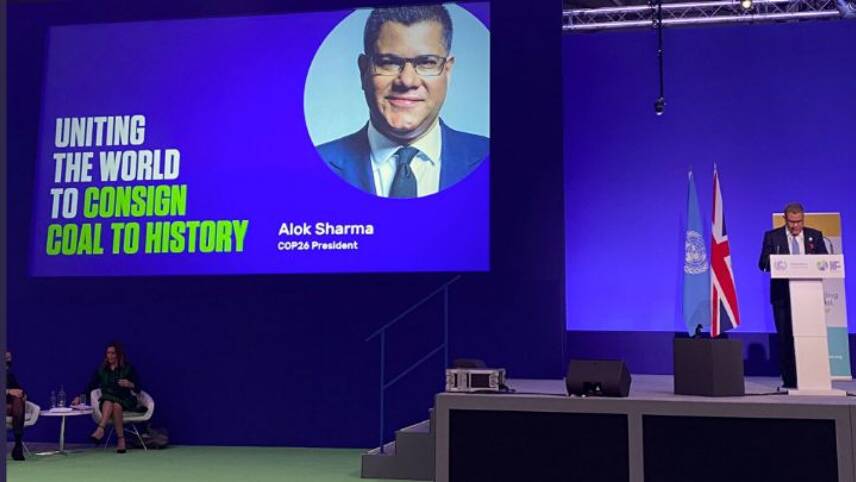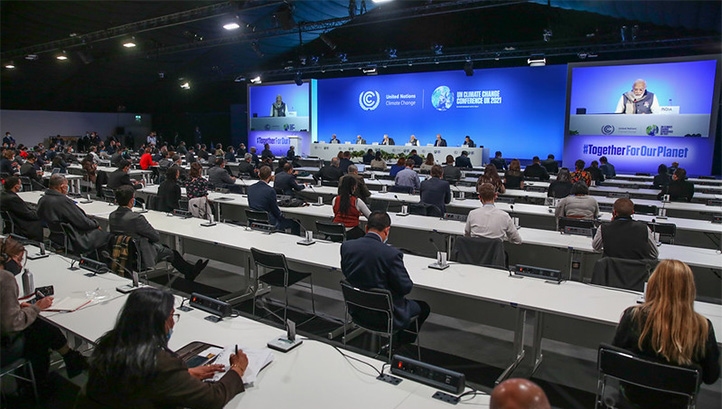Register for free and continue reading
Join our growing army of changemakers and get unlimited access to our premium content

Pictured: COP26 President Alok Sharma on stage today (4 November). Image: Greg Hands MP
Thursday (4 November) marked the second day of the regular presidency programme here in Glasgow, following the World Leaders Summit that opened the conference. Announcements continued to be made at a pace – even if the queues to enter the Blue Zone disappeared. There were huge international commitments on ending coal-fired power generation, while businesses forged collaborations on cleantech and negotiations on the Paris Agreement rulebook continued.
At the same time, innovators and activists continued to meet and showcase in the Green Zone, and businesses across the city hosted their own events in the so-called ‘Pink Zone’ – the city network. Here, edie rounds up seven of the day’s major talking points.
1) Big businesses in high-emitting sectors convene to drive demand for cleantech
In non-COP times, edie is all about bringing news to our networks of sustainability and energy professionals and engaging other business functions with their vital work. So, let’s begin with a story from the private sector.
A new ‘First Movers Coalition’ of 29 businesses across high-emitting and hard-to-abate sectors including aviation, shipping, trucking and heavy industry, was launched today by the World Economic Forum (WEF) and the US’s Envoy for Climate, John Kerry. It will run through to at least 2030 and help to create growing markets for technologies including electric and hydrogen trucks and planes, alternative fuels and carbon capture.
Among the first businesses to join the Coalition are shipping giant Maersk, cement majors Cemex and Holcim, Volvo Group, Amazon and Apple.
2) 190+ parties support Global Coal to Clean Power Transition Statement
Delivering a global coal phase-out of the scale and pace needed to keep 1.5C within reach has been stated as a key ambition of the UK as COP26 host.
Today, more than 190 parties, including China, Poland, other major coal users, national banks and vulnerable nations, have signed up to new measures to end new coal domestically and internationally – while also working to phase-out existing coal capacity and to support workers throughout this process. These pledges are convened in a new Global Coal to Clean Power Transition Statement.
It is believed the new commitments could signal the end for more than 40GW of coal across 20 countries. However, disappointment has been expressed around the decision taken by nations including Australia and Japan, not to join the Statement.
3) Powering Past Coal Alliance expands
A total of 27 new members have joined the Powering Past Coal Alliance (PPCA), bringing total membership to 164 nations, cities and regions. They build on the 50 new members that were unveiled at various times during 2021 and, with these additions, 65% of the OECD and EU countries are now members of the Alliance.
Notable new members include Europe’s third-largest coal fleet in Ukraine, which is targeting a phase-out by 2035 and Chile, which is aiming to bring forward an existing 2040 deadline.
Financial institutions have also joined the PCCA, including NatWest, HSBC, Lloyds Bank and Fidelity International.
The International Energy Agency (IEA) has claimed that reaching global net-zero by 2050 will require all countries and businesses to stop construction of new coal-fired power plants and phase-out existing plants completely by 2030 in the OECD, and by 2040 in the rest of the world.
4) International Just Transition Declaration signed
The UK Government has also marked COP26’s Energy Day by launching a new International Just Transition Declaration, which commits nations and organisations to ensuring that the move away from coal and high-carbon industries creates new green jobs and opportunities for society, especially in emerging economies. So far, 12 nations have signed the Declaration, including the UK and EU Commission.
This news comes after the UK signed an International Just Transition Partnership with South Africa earlier this week. That Partnership will mobilise an initial commitment of $8.5bn. South Africa has previously stated that it will need more financial support from wealthier nations to deliver its coal phase-out and to improve climate adaptation.
5) UN: World facing ‘gathering storm’ with tenfold increase needed in climate adaption finance
It wasn’t all energy-related news this morning. While the agreements on the end of financing for coal projects were more than welcome, UN research has highlighted the enormous funding gap towards climate adaptation planning and initiatives, in advance of a themed day on these issues next week.
The UN’s new Adaptation Gap report concludes that a fivefold to tenfold increase is needed in total levels of climate adaptation finance by 2030. It states that the costs of adaptation look set to reach the higher end of $140-$300bn each year by 2030, potentially rising to $500bn by 2050. This is for developing countries alone. In stark contrast, financial flows provided to developing countries for mitigation and adaptation planning sat at $79.6bn in 2019.
Read edie’s full coverage here.
6) A Pikachu protest catches our eye
Japan will continue to face international scrutiny until it stops supporting coal and fossil fuels. @kishida230, end Japan’s support for all overseas fossil fuel projects and commit to domestic coal phaseout by 2030! #NoCoalJapan #StopFundingFossils @MofaJapan_en #COP26 pic.twitter.com/zibuF2YvzQ
— Friends of the Earth Japan (English) (@FoEJapan_en) November 4, 2021
The protest that went viral on Finance Day was one involving a giant, inflatable loch ness monster, intended to represent the “monster-osity” of climate debt. Nessie was taken by the police before she could go for a float in the River Clyde.
Today, a gaggle of Pikachus gathered at COP26, convened by activists of the No Coal Japan Coalition. Japan was widely criticized at COP25 for its weak stance on coal and, while it has since set a net-zero target, many claim it needs to go further and faster.
The Coalition is calling for the Japanese Government to stop financing overseas coal projects immediately and to end domestic coal by 2030. As a G7 member, Japan committed this year to ending overseas coal expansion finance, but has continued to state that it will support new plants in Indonesia and Bangladesh.
7) Energy efficiency in the spotlight
Not all the news today was about shifting from polluting energy to clean energy – energy efficiency also got a major mention on the agenda.
The UK Government and the International Energy Agency (IEA) launched a COP26 Product Efficiency Call to Action, which aims to double the energy efficiency of air conditioning, refrigeration, industrial motor systems and lighting by 2030. These four activities account for more than 40% of global electricity demand every year.
In total, 14 countries have now signed onto the initiative, which is the largest of its kind. Read edie’s full story here.
Stay up-to-date with the latest news from COP26 with edie’s Live Blog.
edie Staff



Please login or Register to leave a comment.